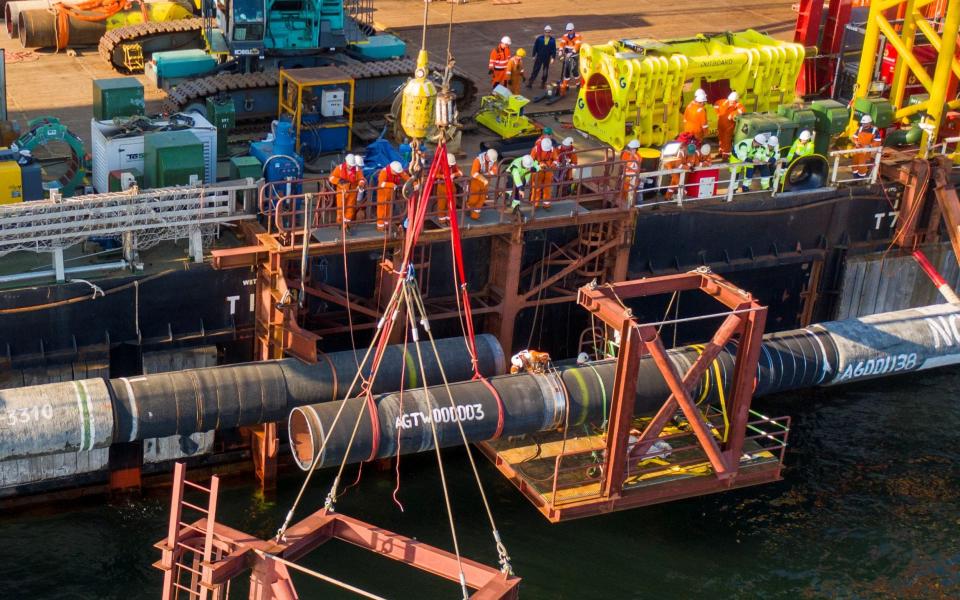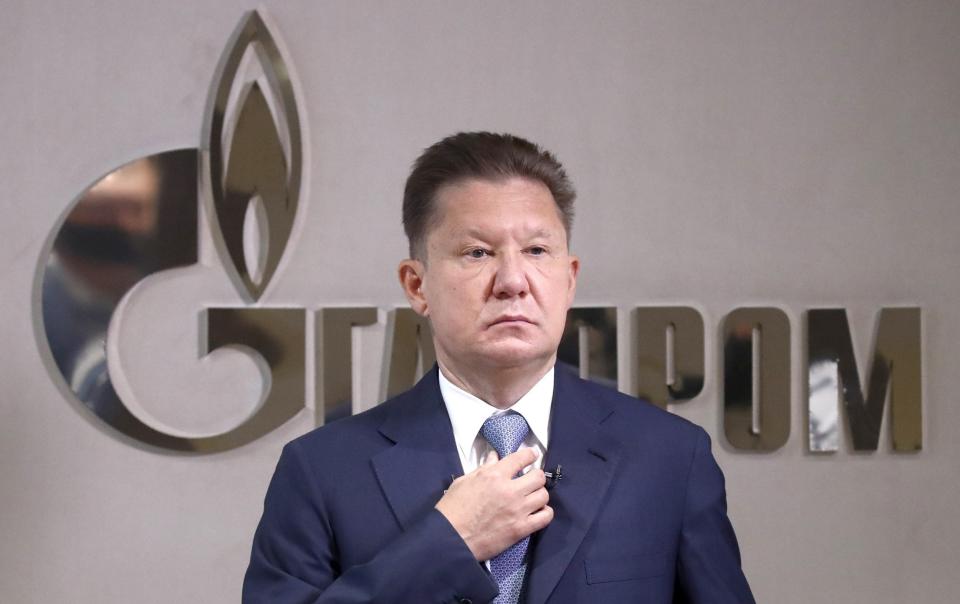Russia accused of rigging gas prices to undermine Britain’s economic recovery

Russia has been accused of increasing gas prices in a bid to undermine Britain and the EU’s economic recovery from the Covid-19 pandemic.
Gazprom, Russia’s state-owned energy corporation, is facing an investigation into a spike in the cost of natural gas and a knock-on effect that threatens to disrupt the supply of meat in the food chain within a fortnight.
On Friday night, more than 40 MEPs signed a letter accusing Gazprom of “deliberate market manipulation” by ratcheting up gas prices to record levels. On Monday, electricity prices in the UK surged to 11 times above normal levels – a record high caused by a crunch in the gas supply chain and a lack of wind to power turbines.
The growing crisis will fuel fears that the Kremlin is able to exert “massive leverage” over Europe through its supply of natural gas.
As a result, household energy bills are likely to rise next year but the immediate effect has been to force the closure of two “globally significant” fertiliser plants in the UK that will lead to shortages of carbon dioxide, a by-product crucial to the meat processing industry and the manufacture of fizzy drinks.
On Friday night, the meat industry said the disruption of the supply of carbon dioxide had “plunged the industry into chaos”. It warned that carbon dioxide stocks would run out within two weeks, forcing the closure of some meat processing plants. The gas is used to stun pigs and chickens prior to slaughtering, and also in the packaging process.
Kwasi Kwarteng, the Business Secretary, was seeking urgent talks on Friday night with the chief executives of National Grid, the regulator Ofgem and the retail supplier Centrica to try to prevent disruption to food supplies.
In a statement, a government spokesman said: “We are monitoring this situation closely and are in regular contact with the food and farming organisations and industry, to help them manage the current situation.”
A senior government source said ministers were increasingly concerned about Europe’s reliance on Russia for gas, although they stressed that the UK was more resilient because of domestic gas supply and imports from Norway.
The MEPs said recent actions by Gazprom raised suspicions of a deliberate effort to use energy prices to apply political pressure to Europe. Gazprom wants to get the green light to immediately start up the controversial Nord Stream 2 pipeline. It has already completed construction but must get the final regulatory approval from Germany and the EU to start using it.

“We call on the European Commission to urgently open an investigation into possible deliberate market manipulation by Gazprom and potential violation of EU competition rules,” the MEPs said in the letter.
Concerns were echoed by senior MPs. Tobias Ellwood, a former minister and chairman of the defence committee, said: “This attempt to manipulate gas prices is an example of grey zone conflict where economies are directly targeted to cause political strife and raise civil unease. An example of the constant competition we now face from authoritarian regimes.”
Chris Bryant, a member of the foreign affairs committee, told The Telegraph: “Russia has been abusing the energy market in Europe for years, holding countries to ransom and forcing up prices. We need a strong united front with other European countries to stop this cynical abuse. Boris Johnson needs to guarantee our energy security without relying on Russia.”
Tom Tugendhat, the Tory chairman of the foreign affairs committee, said on Friday night: “Many of us have warned against Nord Stream 2 because Russia has indicated it is likely to use energy as a weapon. What we are now seeing is that it may already have started.
"If we are going to defend ourselves we need to think hard about cooperating in energy security, not allowing ourselves to be salami sliced with pipelines that cut out some of our partners.”
Gazprom has denied manipulating the supply to drive up prices and force through the opening of the pipeline. Sergey Kupriyanov, Gazprom’s spokesman, told Bloomberg the company “will need to consult its lawyers” over the concerns raised by the MEPs.
“Gazprom delivers gas under consumer requests fully in line with contract obligations and aims to meet requests for extra deliveries whenever possible,” the company said in a statement.
But in separate comments at an online meeting on Friday, Alexey Miller, Gazprom’s chief executive, warned that Europe faced a winter with under-filled gas storage.
Mr Miller said that because of this “we see that prices in Europe have already broken all possible records, and maybe even those already reached will be broken in the near future”.

The British Meat Processors Association said companies’ stocks of carbon dioxide could run out in less than 14 days, meaning some would have to “stop taking animals and close production lines”.
Nick Allen, the chief executive of the BMPA, said: “We’ve had zero warning of the planned closure of the fertiliser plants and, as a result, it’s plunged the industry into chaos.
“The British food supply chain is at the mercy of a small number of major fertiliser producers spread across northern Europe. We rely on a by-product from their production process to keep Britain’s food chain moving.”
Zoe Davies, the chief executive of the National Pig Association, said: “This is the absolute last thing pig farmers need right now. They are already having to accommodate and feed more pigs on farms than they have the space for due to reduced throughput of abattoirs caused by the existing labour shortages. For many this will be the final straw.”
The British Soft Drinks Association said drinks producers were “monitoring the situation” and working with suppliers to mitigate any impact.
Concern over the shortage in Whitehall has prompted a meeting of the Civil Contingencies Secretariat – used for emergency planning – to try to contain the fall-out from the shortages.

 Yahoo News
Yahoo News 
